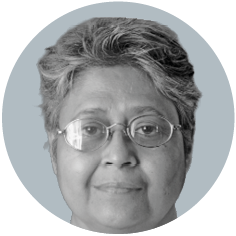Prostitution
Kolkata’s united sex workers
By Aditi Roy Ghatak

People who test HIV positive are not allowed to travel to the USA. Moreover, prostitution is illegal in most of the USA. As a consequence, the XIX International AIDS Conference in Washington DC in July was inaccessible to many people who are affected by the pandemic and who have a role to play in stemming it.
Many of those who were not welcome in Washington, however, met 13,000 kilometres east of the US capital at a parallel conference in Kolkata. The streets of eastern India’s megacity came alive with a colourful rally, including participants from all continents. Politicians and social workers addressed the conference. Why Kolkata, of all places? The reason is the Durbar Mahila Samanwaya Committee, an interest group for sex workers. Salma Kartini, a Malaysian prostitute, said: “Durbar showed the guts to organise such a mammoth conference in very short time after the USA prohibited our entry.” To do so, Durbar teamed up with the Global Network of Sex Workers and the All-India Network of Sex Workers.
All over the world, the sex industry has very dark sides. Human trafficking and the abuse of under-age children are perhaps the worst. Where the entire business is illegal and hushed-up, however, the people affected suffer more than where adult prostitutes have no reason to fear police or public.
In this context, Durbar and a co-operative it spawned, have made a remarkable difference. Today, they encompass some 65,000 sex-workers (male, female and transgender) and clients. They promote their constituency’s sexual health and rights as well as their welfare in general.
Health is of great concern. Sexually transmitted diseases (STDs) and reproductive tract infections (RTIs) are common. In the financial year 2010/11, Durbar provided STD/RTI treatment to almost 13,000 sex workers and 6,000 clients. The organisation distributed 3,4 million condoms.
Durbar’s initiative to prevent the spread of STDs and HIV in Kolkata’s red-light district called Sonagachhi started in 1992. It was initially a government initiative, but soon focussed on training sex workers in health management. It evolved into their taking control of their destiny. In the process, the activists began to tackle collateral challenges of pimps, police harassment, money-lender exploitation and a sneering society.
A path-breaking success came in 1995 when Durbar registered a consumer co-operative society, the Usha Multipurpose Co-operative Society, for and by sex workers. The state government of West Bengal had to amend its laws in order to register a cooperative of sex workers. It did so, and thus officially acknowledged prostitution as the members’ profession. According to a recent Durbar statement, that helped “bolster our campaign for social recognition of sex work and sex workers’ right to self-determination”.
Today, Usha is active in several fields, including microcredit, social marketing of condoms and even job creation outside the sex industry. With more than 5,000 registered members and increasing turnover, Usha has become a success story the state government itself is proud to showcase.








